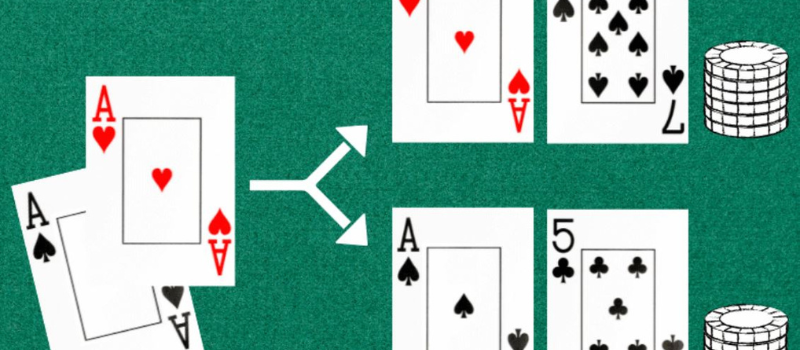Table of Contents
Have you ever asked yourself, “Can I double down after splitting a hand in blackjack?” I’ve been down that road too. After years of refining my blackjack tactics, I’ve come to understand the ins and outs of this move. In this guide, I’ll break down when doubling down after a split makes sense, how it affects your odds, and the situations where it might just be your best play. Let’s get into it.
Quick Tip: Not familiar with the concept of doubling down? You might want to read this article first to fully understand the basics before diving in.
Is Doubling Down After a Split Allowed?
In most casinos, yes — doubling down after a split (commonly known as DDAS) is permitted. And let me tell you, it’s one of the smartest tactics in the game when used wisely.
In my experience playing at countless tables, I’ve seen this rule show up often. Here’s how it works: once you split a pair, you’re typically allowed to double your bet on either or both of the new hands if the cards are in your favor.
I tend to go for a double down when my post-split hand totals 10 or 11, especially if the dealer is showing a weak upcard — like a 4. If you know your blackjack basics, you’ll recognize that 11 is the ideal time to double, particularly when the dealer is vulnerable. And honestly, more often than not, I draw a 10 on top, ending up with a total of 21 — a near-guaranteed winner.
It might sound like a small decision, but using DDAS strategically has really helped boost my long-term winnings.
Now, let’s talk about the house edge. When players are given the option to double down after a split, their potential advantage increases — meaning the casino loses some of its built-in edge. To balance this out, many casinos tweak other rules, like lowering the payout for a natural blackjack from the traditional 3:2 to 6:5.
When Doubling Down After a Split Makes Sense
Through trial and error, I’ve learned that success with DDAS comes down to reading the moment. The sweet spot is when your hand is strong, and the dealer is in a weak position.
For example, if you split a pair and draw a 9, 10, or 11 on either hand, that’s the perfect setup to double down — especially if the dealer’s upcard is a 4, 5, or 6. These are the moments where the dealer is more likely to bust, and your chances of improving your hand with one card are high.
That said, always be aware of the specific table rules. Some casinos limit doubling down after splits to certain card combinations or pairs. So, take a moment before you play to ask the dealer — most are happy to explain the rules quickly.
Can You Double Down on Split Aces?
Usually, no — doubling down on split aces is not allowed.
When you split aces, most casinos only allow one card per ace hand. No additional hits. No doubling down. Even if you pull a 9 or 10, you’re stuck with what you get.
Why the restriction? Because aces are powerful. When you split them, you already give yourself two shots at landing a 21. If you were also allowed to double down, your odds would skyrocket — and casinos don’t want that.
However, there are exceptions. I came across a few casinos in northern Michigan where you can double down on split aces, as long as your double wager is at least $5. It’s rare, but if you stumble upon a place with this rule — take advantage.
When You Should Avoid Doubling Down After a Split
As good as this strategy can be, there are moments when it’s better to pass.
From personal experience, never double down after a split if the dealer is showing a strong card — like a 7 or higher. Trust me, I’ve made that mistake. Once, I split sevens against a dealer’s 7, and then doubled on both hands. I ended up with totals of 13 and 15 — not great. The dealer flipped over a 10 for a 17, and I lost both hands.
That round reminded me not to let confidence override logic.
A Few More Things to Think About Before Doubling Down After a Split
Before you make the move, take a breath. Especially in games with multiple decks, predicting outcomes becomes harder — so don’t rush your decision.
And here’s a word of caution: watch your bankroll. I’ve been swept up in the excitement of doubling down more times than I care to admit. It’s easy to overbet and end up chasing losses. Stick to a clear budget and know your limits.
Next time you’re at the blackjack table, keep an eye out for an opportunity to double down after a split — it could be the edge you need. Try it out in the right moments, and you might just surprise yourself with the results. That extra bet might be what tips the scale in your favor.

